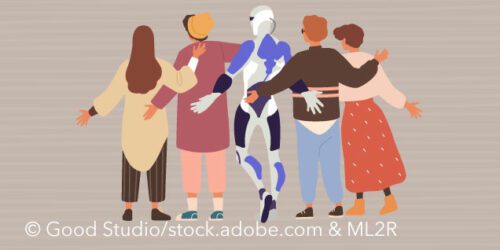ML2R-Blog: Ethics in Artificial Intelligence
December 09, 2021
Artificial friendship with machines, challenges of fair Artificial Intelligence (AI) and accountability of AI-based decisions: In a three-part series, the ML2R-Blog addressed the topic of AI ethics. Guest authors Sara Mann (TU Dortmund University), Dr. Astrid Schomäcker (Saarland University) and Prof. Dr. Eva Schmidt (TU Dortmund University) gave readers exciting insights into current research on the ethically responsible design of AI systems. Gleanings:
Author: Sara Mann
My friend the robot – Can we program friendship?
Friendships with machines are by no means science fiction. The manufacturers of so-called Artificial Companions promise that it is possible to build a real friendship with an AI system. But are robots really better friends than humans or is this a dangerous illusion? Author Sara Mann shows what risks artificial friendships pose, especially for vulnerable groups of people, and why it is sometimes important in a friendship to put oneself and one’s own needs aside.
Author: Dr. Astrid Schomäcker
The mathematical and ethical challenges of fair AI
In her guest article for the ML2R-Blog, Astrid Schomäcker explores the question of when AI decisions as well as the data and algorithms behind them are fair. She outlines two concrete application scenarios that show the challenges one faces in developing fair AI systems. The author concludes: Whether an AI is fair or not is not a mathematical question, but depends on context as well as ethically informed design decisions.
Author: Prof. Dr. Eva Schmidt
It wasn’t me! – Who is responsible for AI-based decisions?
For us humans, it is important that persons bear responsibility for their actions and, if necessary, appropriate consequences. But how can we ensure accountability when, instead of a human, an AI system makes decisions? Author Eva Schmidt explains: The integration of human actors and explainable Artificial Intelligence enables the attribution of responsibility in AI-assisted decision-making processes.
Our three guest authors are members of the research project “Explainable Intelligent Systems” (EIS), a joint project of TU Dortmund University and Saarland University. Learn more about the Explainable Intelligent Systems project.
Contact:
Ann-Kathrin Oster
TU Dortmund University





